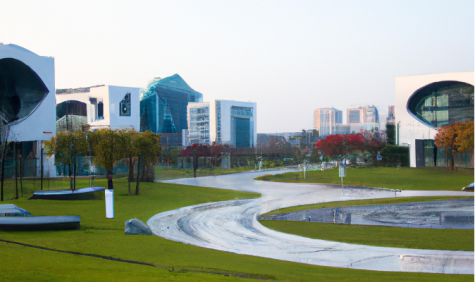Five insights from Future Campus Webinar Week
1. Flexibility in campus planning offers opportunities to adapt to changing scenarios
The Future Campus project completed last year outlined four possible campus scenarios for 2040. The future scenarios presented, ranging from a campus with fully virtual learning environments to integrated physical-digital spaces on campus, are very diverse. Therefore, to achieve appropriate campus development, flexibility and adaptability are needed. This gives room to match the scenario that best suits your campus.
2. Smart Campus technology can be a facilitator for better learning processes
The 'Smart Campus' session showed how technology can be a facilitator for improving learning processes. Consider integrating smart systems that enhance the learning experience, optimise energy consumption and provide personalised support. An example: motion sensors that measure in which room study spaces are still available.
3. Student welfare is hugely important in campus design
Student welfare is an important factor to consider within campus development these days. Therefore, the design of future campus environments should not only focus on academic performance, but rather the personal growth and mental health of students.
4. Libraries may function as dynamic knowledge hubs in the future
In the future, a library will no longer be a place where only books are archived, but a knowledge hub where collaboration, research and innovation are encouraged. An example of this is the new library at Maastricht University. The building, developed with considerable input from students, shows the transformation from traditional learning spaces to multifunctional environments.
5. Co-creation and sustainability can go hand in hand in campus design
The case study of the new Inholland Amsterdam Campus underlined the importance of user participation and sustainability. The development of this campus, which is almost CO2-neutral, serves as a good example for other institutions and highlights the importance of working closely with all stakeholders in designing future learning environments.
How do we move forward with the future campus?
The concluding session reflected on the crucial role SURF can have together with institutions in supporting campus development and innovation. The need for three core activities emerged clearly:
- inspiring institutions with forward-looking ideas
- facilitating knowledge sharing by disseminating good practices
- and providing targeted support to project leaders leading campus innovation within their institutions.
Share your ideas
These insights are valuable and give direction on how SURF can shape its support role. To do that even better, we have prepared this survey (in Dutch). Do you have ideas and suggestions on how SURF should move forward around the theme of the future campus? Then share your views.
Discover the Future Campus project and watch the webinars (in Dutch)
